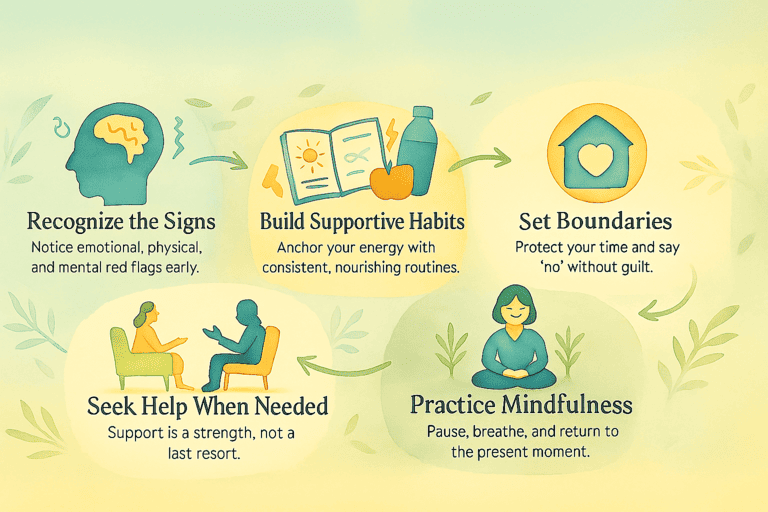How to Handle a Stressful Job Without Burning Out

In today’s work culture, stress is almost unavoidable. Whether it’s tight deadlines, an overwhelming workload, interpersonal tension, or the emotional pressure to perform, stress can quickly accumulate and affect your mental, emotional, and even physical health. But learning how to handle a stressful job isn’t just about survival—it’s about cultivating the tools and mindset needed to stay grounded, intentional, and well.
This article offers practical, compassionate strategies that can help you manage stress more effectively, reduce burnout risk, and build long-term resilience.
Recognize the Signs of Unhealthy Stress Early
It’s important to distinguish between normal work pressure and chronic, harmful stress. While some tension can motivate you to meet goals or perform under pressure, too much for too long can create serious consequences.
Common signs that your job stress may be becoming unmanageable include:
- Constant fatigue, even after sleep
- Difficulty concentrating or staying organized
- Increased irritability, anxiety, or tearfulness
- Withdrawal from friends or family
- Trouble falling or staying asleep
- Digestive issues or frequent headaches
If you find yourself dreading work every day or feeling numb and disconnected, these are red flags worth paying attention to. Burnout doesn’t happen overnight—it builds gradually. Catching it early can help you avoid a full collapse.
Reframe the Stress Response
A helpful way to reduce the psychological weight of your job is to shift how you interpret stress. Instead of seeing all stress as harmful, try viewing it as information. What is it trying to tell you? What’s out of alignment? What needs support?
Reframing stress doesn’t mean pretending everything is fine. It means recognising stress as a signal, not a personal failure. This mindset opens the door to problem-solving instead of panic or shutdown.

Build Sustainable Daily Habits
One of the most effective ways to learn how to handle a stressful job is to support your body and mind with consistent, protective routines. You don’t need a total lifestyle overhaul—just a few small habits done regularly can make a big difference.
Try these:
- Start and end your day with intention: Avoid diving straight into emails. Begin with a few breaths, a stretch, or even just a moment of silence. At day’s end, mark the transition with a walk, music, or changing clothes.
- Hydrate, eat real meals, and move: When your basic needs are met, your nervous system can better handle stress.
- Get sunlight and nature: Even a short break outdoors can help reset your mood and reduce tension.
- Time-block your tasks: Group similar tasks together and protect focus time. Avoid multitasking—it increases cognitive fatigue.
These habits aren’t glamorous, but they are foundational. Without them, any high-stress environment becomes harder to tolerate.
Create Boundaries That Stick
A major contributor to stress is a lack of boundaries, especially if your job encourages constant availability or overextension.
Here are some healthy limits to consider:
- Define work hours and stick to them as much as possible, especially if you work remotely.
- Turn off notifications after hours to reclaim your evening focus.
- Say no or delegate when something is outside your responsibility or capacity.
- Take real breaks during the day—leave your desk, stretch, or go for a walk.
One of the most important parts of learning how to handle a stressful job is knowing when to draw the line—mentally, emotionally, and logistically. Boundaries protect your time and energy. They also model to others that you take your well-being seriously, and they may even encourage healthier behaviour in your workplace culture.
Practice Mindful Stress Recovery
When you’re under pressure, your nervous system shifts into a heightened state. Learning to come back down after stress peaks is just as important as handling the stress itself.
To reset your system:
- Try deep breathing (4 counts in, 6 counts out)
- Use grounding techniques like naming 5 things you see or feel
- Do a quick body scan to relax tight muscles
- Take a mindfulness break using a guided meditation app or a short silence
You don’t need to do this perfectly—you just need to do it regularly. With practice, your mind and body will start recovering more quickly from daily stressors.
Talk to Someone You Trust
If you’ve tried multiple strategies but still feel stuck, overwhelmed, or emotionally flat, that’s a good time to seek support.
Sometimes the problem isn’t just the job itself—it’s the way the job interacts with your core beliefs, past experiences, or self-worth. Therapy can help unpack those layers and build healthier internal responses.
A therapist can also help you explore whether a job change, role shift, or even career transition might be in your best interest, without judgment or pressure.
And if you don’t feel ready for therapy, even talking to a friend, mentor, or support group can help you regain perspective

Remember: It’s Okay to Care About Your Job—But Not at Your Expense
One of the most damaging myths in high-stress work environments is that caring deeply about your job means sacrificing yourself. But that’s not sustainable—or fair. You can be a dedicated, passionate, hard-working person and still have limits. You can set boundaries and still be respected. You can say, “I need support,” and that doesn’t mean you’re weak.
Learning how to handle a stressful job means learning how to take yourself seriously, not just as a worker, but as a whole person.
Final Thoughts
Work stress is real, and it affects people of every background, industry, and personality type. The goal isn’t to eliminate all stress, but to develop the awareness and tools to manage it before it manages you.
If you’re feeling overwhelmed, stuck, or just tired of pushing through every day, you’re not alone—and you don’t have to figure it out by yourself. There are ways to work hard and live well.
Looking for support in navigating job stress or burnout?
I offer therapy sessions tailored to professionals who want to protect their mental health without abandoning their ambition.
Contact us to schedule a free consultation and start reclaiming your peace.